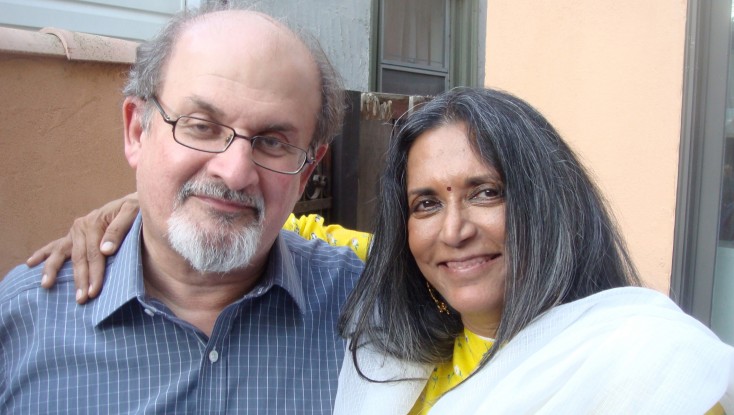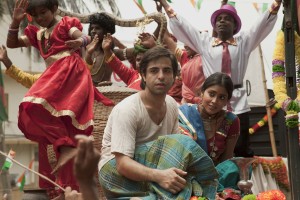By ANGELA DAWSON
Front Row Features
HOLLYWOOD—Salman Rushdie is best known as a bestselling author, speaker and educator, but few might guess this intellectual chronicler of the human condition also is a movie buff. Hailing from Mumbai (formerly Bombay), where filmmaking and moviegoing is huge, it shouldn’t come as a surprise.
Having watched a considerable amount of both Indian and Western cinema, the celebrated author figured it was about time—at age 65—to try his hand at moviemaking. What better way to get involved than to adapt one of his own novels into a screenplay? From his many books, he chose “Midnight’s Children,” an epic story he wrote early in his career about a pair of boys from opposite social classes, who were born on India’s Independence Day and switched by a justice-seeking nurse at the hospital, to live interesting lives as their young country goes through various political and socioeconomic changes. It follows their lives though adulthood, and eventually their paths intersect once again. This adaptation made the most sense to him for a number of reasons. Firstly, it possessed the necessary elements required of broad cinematic story—romance, war, comedy and tragedy. It also contains a lot of interesting characters and eye-popping landscapes and settings. Also, Rushdie says the work was something he felt comfortable rediscovering after so many years with a fresh viewpoint and different understanding of life from when he first wrote it.
With his warm British accent, he also narrates the historic fantasy directed by Indian-Canadian filmmaker Deepa Mehta, as the voice of the main character, Saleem, as he looks back on his life’s adventures.
Of course, Rushdie isn’t giving up his day job. He is enjoying the recent success of “Joseph Anton: A Memoir,” published last fall, which is based on his personal experience living in hiding for a decade after being the subject of a Ayatollah Khomeini-issued fatwa for writing the controversial book, “The Satanic Verses.”
The award-winning scribe is unassuming with his curly hair and scruffy beard, looking very much like the professor/lecturer he is at Emory University, when he’s not authoring books or screenplays.
Q: Can you talk about how the final film turned out? Was it as you envisioned it when you wrote the screenplay?
Rushdie: Truthfully, I had no idea what the film would look like. Both Deepa and I were aware all the way through of this long process that the chance of screwing it up was very high. There was a possibility that we would not pull it off and that kind of terror drove us forward. I knew when I saw the hours and hours of dailies we had the possibility of doing something good. The thing that you can’t ever change is how the film looks and how the actors act. Once that’s done, it’s done. If it’s not there at that point, you are not going to get it. But it was clear when we went through that long process, the film looked extraordinary. Of course, it all depended on the performances of the actors, and everyone gave 200 percent. I couldn’t see a single weak link in the performances.
Q: You provide the narration in the movie. How did you decide to do that?
Rushdie: I am not a great fan of the voiceover in movies and I really prefer it when the movie just tells the story, but Deepa and I came to feel that given that this film is three generations and there’s so many characters and it takes place across a wide geography, it needed some organizing voice just to hold it together. One thing we agreed, which is the reason why I think it works, is that we would never use the voiceover in an expository way. We always used it to add another layer to the story. It was a very late decision to have the voiceover. I settled down to write it and it was an even later decision for me to do the voiceover, because my view had been to get an actor to do it. Deepa did try to do it with a couple of actors, and then she came back to me and she said, “I just don’t like it. I think you should do it. I had to have my arm twisted, but Deepa is very good at arm-twisting.”
Q: Are you a movie fan?
Rushdie: Yeah, I think anyone who knows me at all knows that I have been a movie addict all my life, so in a sense, it doesn’t feel like a strange world to me. I grew up in a city obsessed by cinema and where there are cinemas on every street corner. If you just look at the amount of coverage of film in the Indian press, it’s just extraordinary. It makes Hollywood look like a town that’s not interested in the movies. (He chuckles.)
Q: Do you think you were the only person that could have adapted this?
Rushdie: Well we all know the stories of the books that don’t work (as films), which may be more numerous than the books that do. But I have this part-time visiting professorship at Emory University, and one of the courses I taught there was about the Best Case Scenario adaptation, the moments when it does work. If you look around, there are quite a few examples of that. If you think of, for instance, John Huston’s film of James Joyce’s “The Dead,” or if you think of Martin Scorsese’s “The Age of Innocence.” So there is a best-case scenario, where you can start off with a book that is rich and complicated and you can find a way of making a rich and complicated film. So I thought, “if they can film (Tolstoy’s) ‘Anna Karenina,’ they can film ‘Midnight’s Children’.” (He laughs.)
Q: How was it for you to come back to this material 30 years later and open this up creatively?
Rushdie: Difficult, because I was literally twice the age I was when the book first came out. I finished the book when I was 32 and now I am almost 66. So it literally is half my life ago. I also wrote it at the beginning of my life as a writer. I am not quite the same writer I was then. There are things that you do younger that you would do differently when you are older and vice versa. In many ways, it’s a young man’s book. It reads with the kind of energy and drive of a young man’s book that I kind of admired in my younger self. The only reason I could do it is because I have so much distance from it. If it were a novel I wrote now, I really wouldn’t have thought I was the right person for it. I always thought of it not exactly as an adaptation, but as a thing by itself that would sit well alongside the original. I said to Deepa, “We should not think of it as an adaptation, but as a relative of the book.” Think of it as a cousin, or a sibling. Hopefully, there is a family resemblance. I think the book is less emotional than the film. With the film, the emotions are much more raw and in front. In the book, they are kind of ironized and seen through comedy. You don’t cry when reading “Midnight’s Children,” but a lot of people cry when they see the movie, I am happy to say.
Q: Do you see this as a love letter to India?
Rushdie: Deepa says I said that, but I don’t remember. It was born out of a love for India, that’s for sure. When I wrote it, I was living in London. I was worried about distance and becoming detached from the place where I was born and raised. I wrote it as an act of reclamation, actually.
Q: Would you like to see the Joseph Anton (his pseudonym while in hiding) memoir adapted?
Rushdie: That seems to be happening, touch wood. We haven’t actually signed anything, but there’s a British production company that wants to do it. I hope it’s going to work out because I’m quite close to it.
Q: Who should play you? Ben Affleck?
Rushdie: Yeah. (He laughs.) In this case I think I will not be as directly involved as I was with “Midnight’s Children,” because it’s so close to me and it’s about my life. It’s better if somebody else does it that can bring a different point of view. I don’t know who could do it. I made a mistake in Britain when the book was coming out. A British tabloid journalist asked me who I thought should play me and I said what I thought was a joke, “It should obviously be Johnny Depp because of the close physical resemblance.” The next day, the newspapers reported, “Salman Rushdie thinks he looks like Johnny Depp.” So I thought, I’ll never again make jokes to tabloids. So, literally, I don’t know. Maybe we can find a fresh face (to play me) instead of somebody with a lot of baggage. It’s not my problem, thank goodness.
Q: Are you writing another book?
Rushdie: Yes. I’m just starting to go back to my day job.





